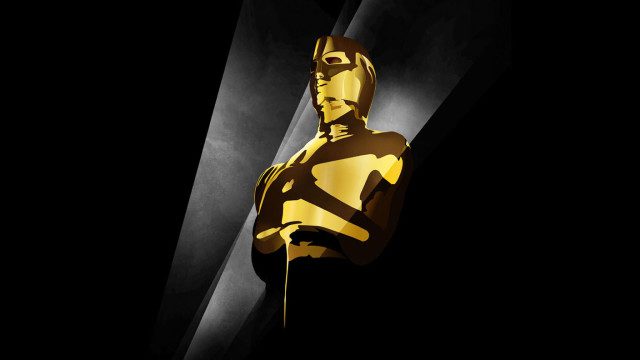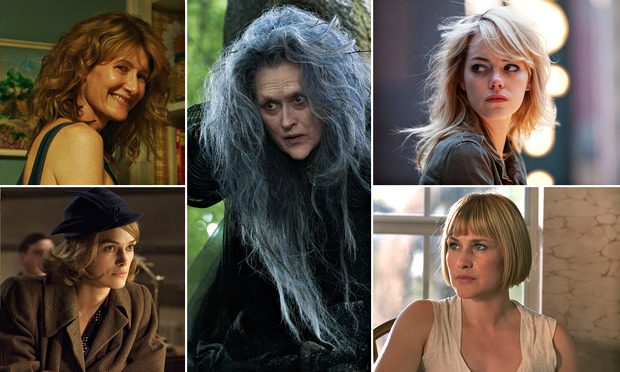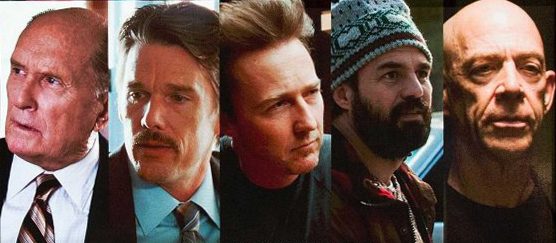If only the enthusiastic raves from movie critics were enough, there would be no need for the industry to hand out awards to itself. Obviously it’s not and the entire year in film, whether remarkable or dismal, eventually feels like a march to the pageantry of the Academy Awards. Much as New Hampshire and Iowa get special influence in primary elections because of being the first states to cast ballots, the Oscars are the most significant and crucial for being the last to go. The Academy Awards are the final word after everyone else has said their piece, as chosen by people in the business (no movie critics, unfortunately). The make up of the voting bloc is overwhelmingly white, largely male, and older.
That’s objectively a problem that has manifested itself glaringly in the whitest list of nominees since 1998 (they can perhaps take comfort in knowing they fared better than the Grammys which were the whitest they’ve been in 35 years). Whereas last year 12 Years a Slave won Best Picture along with some of its cast (particularly Lupita Nyong’o’s win for Supporting Actress) this year not a single person of color has been recognized, which is not just appalling, it’s indefensible–especially if you’ve seen Selma or Get On Up.
Part of that is the problem that too many movies are told and cast from the perspective of upper middle-class whites. But there are good movies made by POC and Hollywood needs to fulfill even the easy task of nominating some of their fine work (a Best Screenplay nod for Chris Rock’s Top Five or Justin Simien’s Dear White People would have been obvious and justifiable).
At the same time, their choices for material are getting more varied and daring. I make predictions in the major categories below along with some analysis. I don’t devote entire sections to the other awards but suffice to say my vote goes to Selma‘s “Glory” for Best Original Song, The Grand Budapest Hotel for Best Screenplay and Original Score, and Whiplash for Best Adapted Screenplay. With the very talented Neil Patrick Harris as host, the 87th Academy Awards should be a lot of fun no matter what the outcomes. Below is my semi-informed attempt to take a stab at what those will be. See you all Oscar night.
Best Picture
American Sniper
Boyhood
Birdman
The Grand Budapest Hotel
The Imitation Game
Selma
The Theory of Everything
Whiplash
A race, fundamentally, between a free form snapshot of growing up (Boyhood) and a behind the stage entertainment biz satire with some belligerently weird hallucinatory sequences thrown in (Birdman). The Oscars have never, ever been weirder than this. It’s telling how far the awards have come that the contest is between two movies that would in past years probably have been peripheral distractions at best. What we’re witnessing is what Owen Gleiberman has called the emergence of the “cool Oscars”.
It’s no longer the ceremony just to bestow prizes on tame predictable fare. No longer do The English Patient or Out of Africa type pics reign unchallenged. We live in a world where The Hurt Locker beat Avatar and critic’s darling (including this one) Beasts of the Southern Wild surprisingly picked up a nomination. The awards are more about codifying some hip observers of film’s sense of what constitutes great art than just celebrating commercialism. The flavor of their choices are increasingly more Raging Bull than Ordinary People.
The rules stipulate that there can be up to ten. For the last couple years it’s capped out at nine. This year we’re down to just eight, which is encouraging for those of us who thought the change from five to ten was a needless move that reeked of desperation. You can see more of the traditional Hollywood in some of these six also-rans. The Imitation Game is stiff and overrated British cinema that shows World War II will always have a place somewhere in the award season.
American Sniper is about our most recent war and though it’s nowhere near as revelatory as The Hurt Locker (or ideologically offensive as its leftish critics maintain) it is a huge hit. Some think it could be a surprise upset. The Theory of Everything is lovely but thin and total award bait fare. The Academy messed up by excluding Bennett Miller’s stark, unsettling Foxcatcher and the far more interesting biopic Mr. Turner. What they got majorly right-besides snubbing Interstellar-is including Wes Anderson’s nearly-perfect The Grand Budapest Hotel and Selma, which is a stunning and hugely important picture. Both have plenty of fans and probably fewer detractors than the two main contenders.
Richard Linklater’s Boyhood, my pick for last year and I think an instant classic we’ll still be talking about decades from now, is strongly but not unimpeachably the favorite to win. It picked up the top award at the Golden Globes and the BAFTA. It has an unheard of perfect 100 on Metacritic. The thing is, for as widely as it’s liked, the massive praise heaped on it has produced something of an inevitable backlash. Even some of its fans will concede some shortcomings (a lack of catharsis, a weak supporting performance here or there).
I regard it as a true achievement and the critical and award success for a nearly three hour plotless movie highly encouraging, but recognize some merit in those arguments (I’d only add that people who fell for The Tree of Life have absolutely no right to get smug about the effusive adoration for this movie). Birdman has picked up the most momentum as of late with wins at the Directors Guild of America and the Producers Guild and a win for Outstanding Performance by a Cast at SAG. It’s a dazzling film that’s awed a lot of people.
On the other hand, it’s not as profound as it thinks it is and honoring it is hardly some subversive gesture. The acceptance and industry-glow around Birdman feels as self-congratulatory somehow as Argo did. If Boyhood loses it will lose the way Brokeback Mountain did: a fatigue from so much hype and inevitability. Given that Birdman actually lost the Golden Globe for Best Comedy to The Grand Budapest Hotel, as has been seldom mentioned, it seems doubtful. Boyhood will win. If it doesn’t: it will be to Birdman, but please oh please, let Selma be the spoiler instead.
Will win: Boyhood
Should win: Boyhood
Best Director
Wes Anderson (The Grand Budapest Hotel)
Alejandro González Iñárritu (Birdman)
Richard Linklater (Boyhood)
Bennett Miller (Foxcatcher)
Morten Tyldum (The Imitation Game)
It often seems to be the case that the winner for Best Picture also grabs the prize for Best Director. For a while it was looking like this year would see a repeat of that with Richard Linklater be honored for Boyhood. He still could and would be a very deserving win for one of the greatest directors we have. A BAFTA and Golden Globe both certainly bode well. However with each new win for Birdman director Iñárritu it is looking increasingly like this will be a split. Most telling was his win at the Directors Guild of America, which has called the eventual winner at the Oscars with only seven exceptions in 66 years. The affection for Boyhood will carry in the Best Picture category and the flashiness (bordeirng on emptiness) of Birdman will give Iñárritu wings in the Best Director race.
I’d pick Wes Anderson for an equally dazzling and impressive film craftsmanship, but the outrage in this race is that the just recipient of the prize wasn’t even nominated. Sure, I would have loved to see Mike Leigh (Mr. Turner) and Jonathan Glazer (Under the Skin) recognized, but the failure to nominate Ava DuVernay here or at the DGA is simply inexcusable. Selma was the most bracing direction I saw last year (the way she depicted the church bombing should have been enough to seal it) and the beautiful balance in the movie between the big scenes and the more personal moments between MLK and Coretta was masterfully done. It’s hard not to read something odious into her exclusion. Most generously, it was one of the Academy’s dumbest calls.
Will win: Alejandro González Iñárritu
Should win: Wes Anderson
Best Actress
Marion Cotillard (Two Days, One Night)
Felicity Jones (The Theory of Everything)
Rosamund Pike (Gone Girl)
Reese Witherspoon (Wild)
Julianne Moore (Still Alice)
Hollywood is, for all its politically liberal proclivities, fundamentally a white male dominated place as far as acting roles go. And it’s getting worse. According to a study done at San Diego State University the number of female-protagonists in the highest grossing films are actually declining. I found myself this year having to scratch my head thinking of female performances, as is often the case, while I had a list of male performances that stretched on and on. In many ways the best I saw last year was Essie Davis in the lead as the mother suffering a meltdown in The Babadook, but wishing for a nomination from a genre movie like that was a pipe dream. So would be one for Scarlett Johansson in Under the Skin. And yet while I missed Two Days, One Night, the other four nominees are all eminently deserving and wisely selected.
Reese Witherspoon gave her most harrowing performances to date in Wild. Rosamund Pike is one of only two reasons I’m curious to rewatch Gone Girl (more on the other one later). Felicity Jones quietly blew me away in a performance of enormous grace and resolve. Julianne Moore is more than a safe bet for Still Alice, she’s a veritable lock. Unlike last year when I felt alone in arguing against Cate Blanchett’s similarly unstoppable award show sweep, I can’t help but agree with the consensus. Moore has been one of our most fiercely intelligent actresses for the last two decades. Far From Heaven should have made her an Oscar winner, but her fifth nomination-this time for a devastating depiction of mental deterioration in a brilliant professor suffering prematurely from Alzheimer’s-will finally do the trick. Yes, it’s the kind of role that appears tailor-made for award season doting, but that doesn’t mean she isn’t terrific or immensely deserving for it.
Will win: Julianne Moore
Should win: Julianne Moore
Best Actor
Steve Carell (Foxcatcher)
Bradley Cooper (American Sniper)
Benedict Cumberbatch (The Imitation Game)
Michael Keaton (Birdman)
Eddie Redmayne (The Theory of Everything)
Last year was, like the year before it, a year marked by many remarkable performances. I could barely squeeze my own list of must-mentions to a top ten, let alone five nominees. And yet, the voters at the Academy have churned out by far the worst selected of any of the categories. Better actors have been passed over and at least one of these nominees is downright undeserving. The best performance I saw last year was bafflingly ignored by the Academy and all the other award shows too, despite all my stumping for it: Chadwick Boseman as James Brown in Get On Up. His performance was Ben Kingsley in Gandhi or Jamie Foxx in Ray spot on. Seek it out.
Ralph Fiennes not getting nominated for his delightful virtuosity in The Grand Budapest Hotel is bizarre, as is neglecting David Oyelowo’s brilliant (and quietly audacious) portrayal of MLK in Selma. Jake Gyllenhaal was a surprise snub for Nightcrawler. The movie is a monotonous sick joke, but he was fantastic. Timothy Spall (Mr. Turner), Oscar Isaac (A Most Violent Year), and John Lithgow (Love is Strange) were all vastly more deserving than the overpraised Cumberbatch. Same goes for Carell. I loved Foxcatcher, but he gives only the third best performance in the movie and it’s an impressive piece of novelty prop acting more than a great one.
The true contest is between Eddie Redmayne, fresh off his BAFTA win for the role and Michael Keaton in Birdman. The money and momentum is on Keaton, who has been an exceptional actor for decades and deserves the recognition. That said, the only one of these performances that makes my own top five is Redmayne as a surprisingly sexy incarnation of Stephen Hawking, for making a part that could have gone deeply wrong extraordinary instead.
Will win: Michael Keaton
Should win: Eddie Redmayne
Best Supporting Actress
Patricia Arquette (Boyhood)
Laura Dern (Wild)
Keira Knightley (The Imitation Game)
Emma Stone (Birdman)
Meryl Streep (Into the Woods)
At last year’s awards the Academy fixed the mistake made by the Golden Globes when they honored Jennifer Lawrence for American Hustle. Don’t get me wrong, I’m a Jennifer Lawrence fan who thought American Hustle was terrific, but passing over Lupita Nyong’o for her shattering performance in 12 Years a Slave would have been insanity. This year there’s no egregious mistake to correct. There’s also, alas, no woman of color represented either.
A damn shame as Carmen Ejogo’s turn as Coretta Scott King is as vital to the greatness of Selma as anyone or anything else in it. As surely as J.K. Simmons will win in the race for Best Supporting Actor, Patricia Arquette has this one all sewn up. Boyhood is a vast and sprawling movie with characters who undergo twelve entire years of growth and change. That’s usually the most important criteria to judge writing, along with acting, by. But she’s in many ways the most constant presence in the movie. Hers is an affecting and empathetic depiction of the dedication of one hard working single mother who deserved a lot better than the men she was with. In scene after scene Arquette is often as funny as she is moving.
It’s an amazing performance, absolutely integral to the marvelousness of the movie. Twelve years of devotion to a role like this one may warrant some even higher honor, but for now an award season sweep culminating with this Oscar win will have to do.
Will win: Patricia Arquette
Should win: Patricia Arquette
Best Supporting Actor
Robert Duvall (The Judge)
Ethan Hawke (Boyhood)
Edward Norton (Birdman)
Mark Ruffalo (Foxcatcher)
J.K. Simmons (Whiplash)
In the movie Whiplash just as in the award season run that has followed it, the always enjoyable character actor J.K. Simmons is a towering, daunting force. His part in Damien Chazelle’s exhilarating break out is one of incredibly imposing physicality and rapid-fire insults. He is R. Lee Ermey’s drill instructor in Full Metal Jacket reborn as a jazz bandleader who is a perfectionist of nearly ludicrous proportions. Unlike his costar Miles Teller, the role is insanely over the top and Simmons relishes and excels in the implausible villainy of it.
He’s a total blast to watch. The award is his to lose–which they’re doesn’t appear to be any risk of after his wins at the Golden Globes, SAG, the BAFTAs and seemingly everywhere else he’s been nominated. Simmons is up against some other stellar talent, as overshadowed as it is–although I have to decry the absence of Tyler Perry who gave a sharp, funny performance in Gone Girl that was arguably the best thing in it (and single-handedly kept the inferior second half of the movie more or less afloat). I haven’t seen The Judge yet, but Robert Duvall is one of the greatest actors of the last several decades and I don’t doubt he’s worthy. In Birdman Edward Norton had good fun making light of his own reputation.
Ethan Hawke had his best role to date as the dad who slowly gets his act together in Boyhood. He’d be my second choice for the award, and probably seemed like a possible front-runner until Whiplash came out. This won’t be his year. Nor will it be for the terrific actor who gives the finest performance of the bunch, Mark Ruffalo as the wrestling coach in Foxcatcher, who subtly underwent a physical transformation to play the late Dave Schultz. No matter. He’ll be up again. This award belongs to Simmons, which is nothing to lament.
Will win: J.K. Simmons
Should win: Mark Ruffalo







